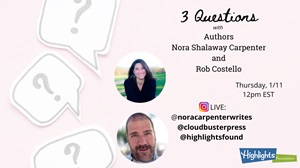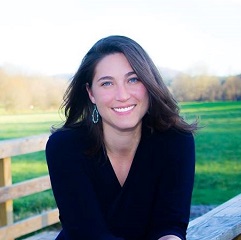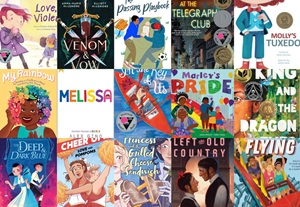Faculty members Rob Costello and Nora Shalaway Carpenter joined Cat Galeano on Instagram Live to talk about their mini-course Intro to Writing Short Fiction: A Two-Night Mini for MG & YA Authors. Watch the conversation below. (Please note: closed captions are available in the video below. You can see them by hovering over the bottom of the video and choosing the “CC” icon.)
Some Takeaways:
You Never Know Dept: Nora shared that Malinda Lo’s award-winning book Last Night at the Telegraph Club started as a short story. Her agent suggested that there might be more there, and there was!
Practice for Your Novel: Rob says that “short stories are a great place for new writers to start because they’re small. You you have to work with all of the tools of writing fiction. So plot, character, theme, pacing. All of that is essential to crafting a good short story AND a good novel. And once you get your confidence and to get, you know, the wind under under your wings writing short stories, you really feel ready–more ready anyway–to to to tackle longer projects.”
Trying New Things: Nora says “the short form just offers a lot of variety and it’s a great place to try those things and tackle or especially like if maybe you want to write a short story and you wanna try out second person point of view. Because maybe you have a novel idea that you’re like, oh, I’d kind of like to do that, but you know. Before I spend two years or more working on that, what can, can I do it? Can I write like a really interesting piece in which that point of view works.”
Full Transcript:
Cat: A big hello to our highlights Foundation family. We’re so happy to have you here with us. For those that may not know, I’m Cat Galeano. My pronouns are she/her and I’m the social media manager for the Highlights Foundation. I’m joining you from Westchester, NY, on the traditional lands of the Siwanoy people. I’m also a writer and a reader who is so so excited to have this lunchtime chat with our friends and faculty Nora Shalaway Carpenter and Rob Costello, where we’ll talk a little bit about their upcoming mini course: Writing Short Fiction: A Two-Night Mini for Middle Grade and Young Adult authors.
So we’re going to jump right into it, if that’s OK.
My first question for both of you is:a lot of people have publication on their mind when it comes to short stories. Can you tell us about how your first short story made it to publication in the industry?
Nora: Yeah, they’re very different stories. Rob, why don’t you go first and then I’ll hop on.
Rob: So I think that it very much is a pathway to publication. Writing short fiction is a great way to start.
And taking me back all the way to the mid-to-late 2000s.I don’t actually remember the year it was, but the first story that I ever published professionally was a very, very little story, 150 words basically flash fiction–almost something called a drabble, which is 100 words and it was adult fiction, and I published it in a magazine called Narrative, which maybe some people have heard of.
It’s a pretty prestigious magazine and I was thrilled. Like I just sent it on a lark, I just, I saw the the the call for 150 words and I dashed something off and never thought I’d hear anything and I got paid which was great.
But the biggest thrill of all for with that was that they they posted everything on their website and you know. They have all kinds of lights–I mean, it’s a fairly well established magazine.
And so one day I happened to log in to see my story, you know, because I was excited and on their main page they have headshots of several of the authors in that issue of the magazine and there was my headshot and two headshots over was Margaret Atwood.
I died. I absolutely died and I took like 50 screenshots and saved them and I posted them on Facebook and it’s like it’s still one of the highlights of my writing career. It was the most exciting thing ever. So that’s my my first publication story.
Cat: I mean…
Nora: Oh my God. I don’t think I knew that story!
Cat: That is incredible. Wow.
Rob: It was really cool.
Nora: So Rob definitely published short fiction before I did. I grew up writing short fiction that was like: what I wrote. I think especially for like young writers or or people that come to writing maybe later. And like it’s a, it’s an easier, more manageable genre, right? Because I remember being a young adult and and being like, OK. I can, you know, kind of tackle this short story. But I can’t imagine ever writing a novel which you know, and then you grow in your career and you can do eventually. But anywho, so I did win a couple awards. I won a couple state awards with my short fiction. But in terms of like professional publication? My…I…I…I put together an anthology and so included one of my own stories.
Rob: That’s a good way to go!
Nora: Yeah. That’s not like the usual route. Like, I don’t want people to get the wrong idea but yeah, for all different reasons that worked out and a lot of it had to do with timing and what was what was happening in the world and um…the book Rural Voices was just really kind of like in popular culture like the, you know, interest in rural people. I guess of the timing and so, so that kind of brought me back into short fiction. Which I really hadn’t dabbled in much since my earlier days. And then I now I just keep like doing it and um yeah. It’s really fun.
Cat: I just love what you say and I want to just reiterate it. Like the idea of writing short fiction is a little bit kind of easier to the mind. As opposed to the novel or your life. Oh my God. 300 pages, 200 pages, seems unfathomable, but yeah, so I feel like I just love that you said that because it IS true. Like I’m currently tackling a YA and I’m still like: um, do I really know what I’m doing? Not really. And then someone will call me for like a zine and say like hey, can you pop out this short story? And I’m like yeah, do-do-do, that’s done. So, like, I love that you said that because I feel like all of us can resonate with that. So I really encourage everyone to come to the class–for those that either want to play in the short story format and haven’t really gotten there or are too overwhelmed with the novel idea and prefer to stick in that short story realm. Truly everyone, please come.
I’m going to jump into our second question, which is the description says for new writers: short stories offer a way to express the basics of storytelling and develop the skills essential to crafting publishable fiction. Can you give an example of how that has played out in practice? Either for you or other writers you’ve worked with.
Nora: I forget is this mine?
Rob: Yeah, why don’t you jump?
Nora: I was like, what? Alright, so how has it worked out for me? OK, so I think one of the the most interesting stories that I’m thinking of is Malinda Lo’s award-winning novel that–why am–Last Night at The Telegraph Club. I was like, what is? It’s, you know, OK. That actually started as a short story, and so it’s just a great example of how you can play around with it. Like she and Malinda had no idea, like, I actually specifically asked her. And she had no idea that that would eventually become a novel. Like it wasn’t in her wheelhouse at all, she wrote it for an anthology. And then her agent was like, “hey. I think you can maybe do something more with this.” And it’s really interesting and I encourage everybody to look at the short story and I think it’s in All Out. I think it’s in one of the All Out anthologies and then read it and then read the novel. Or if you’ve already read the novel, go back and read and see the differences. See how different the characters are, like their goals and expectations. Like how it changed because it’s not just like a shortened, you know. It’s not like one chapter from the novel that then became, yeah, that then was its own piece. It was very very different. And so it just it, just shows and..and, like Melinda would have never written that novel if she hadn’t tried that. You know which is really cool.
And then in my own work. So I just I just in February…in September published a novel called Fault Lines. And that book has a little bit of magic in it. And in one of my anthologies Absolutely Normal, my short story in that has magic too. And it’s like, I was kind of playing with: how can I make this magic work and the magic is a little different in the book and the the short story is actually very different but but kind of like the sense of like that there’s this energy that you can tap into is the same and so the short story actually allowed me to play with that to be like: Is this something I can pull off? How would I make it work in a shorter piece and then I really, really liked it and I was able to then transfer it to a longer form.
Cat: I love that too. Like I I never really thought about sort of using the short story format to to really play with characters with time and space or whatever. And then sort of develop it into a larger format. I never thought of that. So I am learning something new already. So I like that. Rob, did you want to add something? Or you want me to to jump into…
Rob: Well, just first I wanna add that Nora’s novel and her short story are fabulous and everybody should go out and get them and read them. But back to the original question. Like you know, when we we touched on this a little bit the idea that short stories are a great place for new writers to start because they’re small. You you have to work with all of the tools of writing fiction. So plot, character, theme, pacing. All of that is essential to crafting a good short story AND a good novel. And once you get your confidence and to get, you know, the wind under under your wings writing short stories, you really feel ready–more ready anyway–to to to tackle longer projects.
So Nora and I both know a student we worked with in Whole Novel in 2022, named Sarah Maxfield and she started writing flash fiction. Which are really, really short stories, and she sort of segued to working on graphic novel scripts and that’s what we worked with her, with her at Whole Novel on. But then she’s started writing a novel, right? And so I, I worked with her on my anthology We Mostly Come Out at Night. She contributed a story to that because I loved her writing so much, I I asked her if she’d like to contribute, and so we’ve stayed in touch and she sent me her novel to read and it’s it’s wonderful. And she’s about to go on submission with it now. I mean about to query it. And so I don’t know that you she would have been ready for that stuff without the the practice and the training that short fiction gave her to build her up to the level of writing a novel.
Cat: Yeah, but I also…oh, I’m sorry, go ahead, Nora.
Nora: I was going to say to add on to that. Like I want people to know that short fiction, it doesn’t just have to be prose. Like what Rob was saying, like, you know, like there are graphic shorts that you if that’s like something you’re interested in. You could do a verse short like you could do different forms of prose like and like the short form just offers a lot of variety and it’s a great place to try those things and tackle or especially like if maybe you want to write a short story and you wanna try out second person point of view. Because maybe you have a novel idea that you’re like, oh, I’d kind of like to do that, but you know. Before I spend two years or more working on that, what can, can I do it? Can I write like a really interesting piece in which that point of view works.
Cat: I am learning so much and I wish I was taking notes. But thankfully I can rewatch this after so… Because I I love what you said. Like what Rob was saying about, you know, this this student of yours that jumped into graphic novels after writing flash, flash fiction and then then the novel, and then what you said Nora, too, of like. Playing around in that short fiction and then writing a novel in verse, switch to short fiction and just like sort of jumping around. I feel like, I feel like people probably forget that just kind of ;earning the short fiction format really can just catapult you into every direction of writing in general.
Nora: And I think also there’s so many, sorry I just..
Cat: No! I love it, I love it.
Nora: I think that’s the first question where like a lot of people come to it because of publication. They wanna write something they wanna get published right away. And I think that, you know, I understand that, but I don’t think that should be the only thing because like, as Rob knows, all the time things come up where you don’t know about something and then all of a sudden there’s like, hey, there’s a call for this type of story, or there’s a deadline for this competition. And it’s like in two weeks when you find out and so it’s really hard to like, bang out a really good short story in that time. At least for me. But if if I have like a bunch of short stories already written that I’ve been experimenting with and that are in pretty good shape, then I can just like go through them. And be like oh, OK. I think this one would fit it. So like I don’t want people to think like “I’m not gonna spend writing time on this because it’s a waste. Or I’m not gonna use it.” It’s like that is like the complete wrong way to think about it. They can be useful in so many ways.
Cat: Yeah, keep writing those little nuggets. People, do not throw away those those short stories you have stored in your computer. So I’m going to jump to our next question, which is our last question. Now for more experienced writers, it says short stories present an exciting and enjoyable medium for play and experimentation. How are you both using them now in your careers?
Rob: So why don’t I jump in first with this because my novel writing and my short story writing bleed into each other all the time. So for example, I am working on a an anthology proposal with a friend of mine, Jennifer Richard Jacobson, and I wrote a short story for that and it wasn’t quite right and I didn’t love it for the anthology proposal. But I love the story and I love the idea. And so I’m not going to get rid of it like I’m going to do something with it. So I decided to to write my first middle grade novel using the short story as the framework and and I just finished it a couple of months ago and I sent it to my agent and hopefully we’ll be going on sub soon. So that’s just one example of how short stories seed my my longer fiction.
Rob: And then in the reverse I I have my debut short story collection coming out in March. And three of the stories in there started out as parts of novels that didn’t work in the novels they were in. But I loved the idea. I loved, you know, it’s like a chapter here, an idea there. I don’t throw anything away. I’m like if I wrote it I want to use it somehow. So they came out of the novel and and I was like, well, this would make good short stories like I can make this into a short story. And I did and and and and I love them. So I think once you start writing them, you realize how fluid, uh, how fluid that relationship is between getting longer work and shorter work, and all kinds of great things can come from it.
Cat: That is incredible. I love that. I love that you accept fluid motion, that one sort of helps the other and back and forth. I think that’s so special and so important to remind people because I feel like it’s easily forgotten. Yeah.
Rob: Yes, nothing is wasted. Don’t waste anything.
Nora: No, and I I’ll just say that right now in my career like I use the short form mainly to experiment with like newer themes, like if I if there’s a theme that I want to try out or a a new form that I want to try out like that’s where I go with my short fiction. And I did…so I have…so the novel that I actually got my agent with like never ended up being published and um, that’s OK. Like I was sad at the time, but now I’m like that, that’s good, but I could do better, but: I really like, there are things in that book that I just really love. And so I will occasionally pull from it and put them in like short fiction pieces. And that makes me so happy because it’s like that one story will never be published but like there’s still so much of it that I was able to put out in the world. So you just, I would have never imagined that that would have been the case. So like Rob said, like I don’t throw anything away like even, you know, even if I get tired of something and I’m like ohh. OK. We’ll just not open this file for a while..like you just don’t know when you might need it or when it will come in in handy.
Cat: Oh my gosh, that iss so cool. Like your story, essentially like has multiple lives because it’s out in different stories.
How cool is that? So that that, like you said that one novel that you had that you were crushed that it didn’t goo places as the full format now lives in multiple spaces. Ah, how cool is that? Like Rob and Nora said, do not get rid of your things because they will have a second life. Maybe a ninth life. If you’re lucky, when you spread them all over the place.
Well, thank you so much. I’m gonna just close out our conversation. If you’d like to learn more from Nora and Rob, please register for their two night mini Intro to Writing Short Fiction: a Two-Night Mini for middle grade and young adult authors taking place January 33, 3020. There’s no 30. There is no 33rd. Excuse me, January 23rd and 25th at 7:00 PM Eastern. If you attend the class live, if you cannot attend the class live, please do still register. You’ll get the recordings emailed to you after the close of the course. Their books are also also available to purchase at our Virtual Book Shop, powered by bookshop.org. Thank you, Nora. Thank you, Rob, for joining me today and we cannot wait to see you online soon. Thank you.








